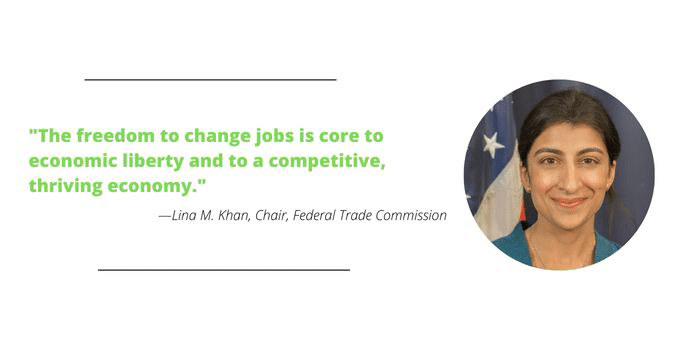Last month, the Federal Trade Commission proposed a new rule that would ban employers from imposing noncompete clauses on their workers. An upcoming webinar from the Small Business Legislative Council will address the issue and the proposed rule.
An End To Noncompetes
In January, the FTC proposed a rule that would ban businesses from requiring their employees sign noncompete clauses and rescind existing noncompete clauses.
- Noncompete clauses are a contractual term between an employer and a worker that blocks the worker from working for a competing employer or starting a competing business, typically within a certain geographic area and period of time after the worker’s employment ends.
- The proposed rule would apply to independent contractors and anyone who works for an employer, whether paid or unpaid.
The FTC cited the clauses’ impact on wages – both for both employees subject to them as well as workers who are not – and employment opportunities as the impetus for the rule.
- The FTC says that noncomplete clauses “prevent new businesses from forming, stifling entrepreneurship, and prevent novel innovation which would otherwise occur when workers are able to broadly share their ideas.”
- The Commission estimates that the proposed rule would increase American workers’ earnings between $250 billion and $296 billion per year.
“The freedom to change jobs is core to economic liberty and to a competitive, thriving economy,” says FTC Chair Lina M. Khan. “Noncompetes block workers from freely switching jobs, depriving them of higher wages and better working conditions, and depriving businesses of a talent pool that they need to build and expand. By ending this practice, the FTC’s proposed rule would promote greater dynamism, innovation and healthy competition.”
Elizabeth Wilkins, director of the FTC’s Office of Policy Planning, says, “Research shows that employers’ use of noncompetes to restrict workers’ mobility significantly suppresses workers’ wages—even for those not subject to noncompetes, or subject to noncompetes that are unenforceable under state law. The proposed rule would ensure that employers can’t exploit their outsized bargaining power to limit workers’ opportunities and stifle competition.”

Policy Insights
Promo industry practitioners have a few options to learn more about the noncompete clauses and the proposed rule and submit their perspectives on the issue.
The SBLC – an independent, permanent coalition of national trade and professional associations, including PPAI, that represents small businesses in federal legislative and regulatory issues – is hosting its first webinar of 2023 on the use of employee noncompetes and other restrictive covenant agreements. The March 2 webinar will cover:
- The FTC’s proposal to ban noncompetes
- State and local legislation limiting the use of noncompetes
- Options for small businesses to protect their interests and information in light of the pushback against using noncompetes.
PPAI has arranged for the webinar to be free to the Association’s members, although space is limited and available on a first-come, first-served basis. Association members can register here and should identify PPAI as the association that invited them.
The FTC is requesting members of the public submit written comments on the proposed rule. It will also host a virtual public forum on February 16, during which the commission will hear from a series of speakers who have been subject to noncompete restrictions, as well as business owners who have experience with noncompetes. Members of the public will also have an opportunity to comment via livestream.


